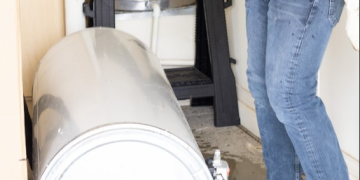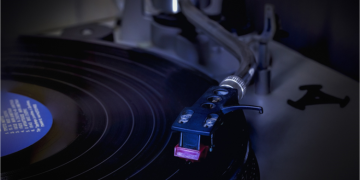How does a water heater work?
The basic operation of a water heater is relatively simple – it uses a fuel source such as gas, electricity, or oil to heat water in a tank. Unlike traditional boilers, they do not require you to immediately use large amounts of heated water, making them the preferred choice for many households. Within the water heater tank are high-pressure control valves and an anode rod which helps to prevent rusting of the metal tank by absorbing some of the minerals that can be found in tap water. The appliance also contains a temperature and pressure relief valve which acts as a safety measure against any sudden spikes or drops in either temperature or pressure within the appliance. Hot water is created when cold water enters the bottom of the tank and is forced up through tubes heated by gas, electricity, or oil. It then mixes with other pre-heated water in the top portion of the tank and continues traveling through pipes out into your home’s plumbing system.
How to stop a water heater from leaking?
How to stop a water heater from leaking? The best way to stop a water heater from leaking is by inspecting its condition regularly. Several signs can indicate if there might be a potential leak. First, check for any cracks or rust outside the tank. Second, inspect all the fittings, pipes, and valves connected to them. Third, if possible, take off the drain valve and inspect for any signs of water leakage behind it. Finally, have a professional plumber check your heater’s thermostat settings and pressure relief valves. Following these steps will go a long way to ensure that your water heater runs correctly and without leaks.
Is it dangerous to have a leaking water heater?
A leaking water heater can indicate major problems, making it difficult to ignore. When water is leaking from your water heater, it is likely the result of a corroded tank, sometimes caused by hard water or high mineral content. This corrosion can cause small pinholes or larger cracks that could impact the entire system. Aside from the leakage, having a malfunctioning or broken down water heater at home poses additional risks, such as electrical hazards, possible fires, and even carbon monoxide poisoning due to inefficient fuel burning. Taking precautionary measures is essential if you suspect a problem with your water heater – because even the smallest leak can signify something much bigger going on with your plumbing.
How do I get rid of my old water heater?
When it comes to getting rid of an old water heater, the process can seem daunting. However, there are a few simple steps that you can take to make sure that you responsibly dispose of your water heater in an environmentally friendly way. First, check to see if there are any local regulations or codes in your area regarding the disposal of water heaters. If so, follow all established guidelines regarding appropriate disposal. You may also be able to find a recycling center that will accept the tank for scrap metal and possibly provide you with a rebate on the purchase of a new system. Additionally, some towns or cities may offer free removal services for certain appliances. Finally, if all else fails, enlisting the help of a professional disposal service is always an option that ensures your water heater is disposed of correctly and efficiently.





























































